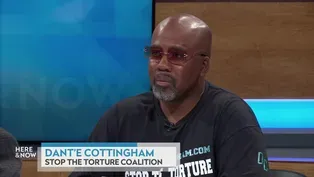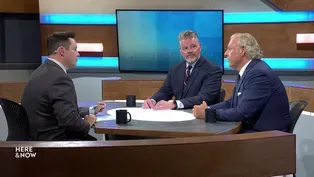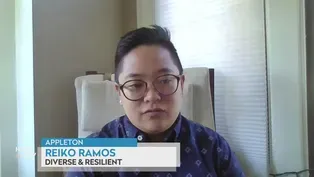Here and Now
Wisconsin Prisons Lag in Treating Substance Use Disorders
Clip: Season 2200 Episode 2248 | 6m 21sVideo has Closed Captions
Wisconsin prison inmates seeking to recover from addiction face long waits for treatment.
Many inmates in Wisconsin prisons seeking to recover from addiction face long waits for substance use disorder treatment as wrangling continues over resources for the state Department of Corrections.
Problems with Closed Captions? Closed Captioning Feedback
Problems with Closed Captions? Closed Captioning Feedback
Here and Now is a local public television program presented by PBS Wisconsin
Here and Now
Wisconsin Prisons Lag in Treating Substance Use Disorders
Clip: Season 2200 Episode 2248 | 6m 21sVideo has Closed Captions
Many inmates in Wisconsin prisons seeking to recover from addiction face long waits for substance use disorder treatment as wrangling continues over resources for the state Department of Corrections.
Problems with Closed Captions? Closed Captioning Feedback
How to Watch Here and Now
Here and Now is available to stream on pbs.org and the free PBS App, available on iPhone, Apple TV, Android TV, Android smartphones, Amazon Fire TV, Amazon Fire Tablet, Roku, Samsung Smart TV, and Vizio.
Providing Support for PBS.org
Learn Moreabout PBS online sponsorshipequality.
>> All right.
Dant'e Cottingham, thanks for coming in today.
Thank you for having me.
Treatment is a key word in corrections, not only in how inmates are treated, but whether those struggling with addiction can get access to treatment.
Here in now.
Reporter Aditi Debnath and PBS Wisconsin are collaborating with Wisconsin project, asking people what issues matter to them this election season.
This is the first story in that series.
>> Some people don't have anybody, and on your release day, you get your boxes and you are put out on the doorstep.
Like if you have a place to go or not.
released from Wisconsin prisons in 2023.
That's roughly 550 every month for those with substance use disorders.
That reentry period is critical.
And so at the time of reentry, we know that rates of returning to use to substance use are very high.
That in combination with someone having now really no tolerance, puts them at super high risk for having an overdose if they return to use.
Doctor Elizabeth Salisbury Afshar is a public health expert at UW-Madison.
She treats patients with substance use disorders at UW Behavioral Health and Recovery Clinic.
If you compare rates of overdose in Wisconsin to national numbers, we are definitely one of the states with higher overdose rates.
>> I was naive to a lot of that.
>> Amanda Church is a care provider at an assisted living facility in Monroe County, and a mother of two.
She was released from the Techeetah prison in Fond du Lac in 2022 for drug related offenses.
>> Oh, just try this.
You know it's not going to hurt you.
You'll never get addicted.
And you believe that as a kid like that, you have the willpower to not get stuck using those drugs.
And it goes downhill from there and fast.
>> Less than 10% of people that complete the Wisconsin Department of Corrections substance use treatment program are re-incarcerated during their first year of release, but there's a massive wait list for the program.
Alicia Krause is the director of program services for the Doc's adult prisons.
>> We understand that there's a large number of our population that needs assistance in working through their substance use disorders.
>> Roughly 845 people in the doc's facilities are currently enrolled in a substance use disorder treatment program, yet more than 11,000 people are on the waitlist.
>> And we would like to be able to serve every single person that we come into contact with at the highest level that they need in terms of intervention and more research, more resources would allow us to do that in the current state budget.
fund Evers proposal for expanded substance use disorder programing.
That includes things like mental health, education and early release opportunities.
Detoxing abruptly in prison can be dangerous and ineffective in the long term.
>> You'd have the chills and then you'd be high.
And, you couldn't get comfortable throwing up the race thoughts because you're just starting to get your feelings back and like, you instantly go into that regret and shame and guilt and all that medication for opioid use disorder is one treatment that the doc is trying to make more accessible.
>> Doctor Salisbury Afshar explains a couple of reasons why medications like methadone work the first is we know these medications save lives.
They are first line treatments.
>> We're piloting a medication assisted treatment program at one of our facilities in Milwaukee, the Milwaukee Secure Detention Facility, with plans already rolling out to expand that to other sites within the division.
people are incarcerated, it is the legal responsibility of the jail or the prison.
Whatever environment someone is in to provide adequate health care.
In the current budget, the legislature provided more than $4.6 million to expand access to medication for opioid use disorder in prisons.
That's different from the rejected proposal, which sought to expand programing.
The third reason, I would say is I just think this is morally imperative, morally imperative, she says.
Because this medication that's not widely available in prisons can prevent overdose deaths and reduce continued drug use and reincarceration rates.
Church says that she received medications meant to treat some of her withdrawal symptoms, but not her substance use disorder.
>> They don't have no sympathy for that.
They're like, you know, you're just a junkie like, sit it out.
That's why you're here and you're a criminal.
And a lot of the employees aren't there to help you.
>> Experts say people in recovery from substance use need continued support, safety and community to continue their recovery.
the other people that are going through the same thing as you, our peers.
>> Most of them feel like nobody cares.
Nobody understands.
support specialist at Just Dane, a nonprofit that supports people affected by incarceration.
addiction and you've been to prison for 15 years and now you're doing this, I want to know how you did that.
He says his own path to recovery could have started earlier if he'd had someone to relate to.
I want to know how you got here because I've been trying to do this for 20 years, and I've been failing for 20 years.
accessible as a lifeline to people who are in crisis and want to use again.
>> I just let them know, like, hey, before you make that decision, call me, please.
And I've had individuals call me like, hey, you know, I'm in a bad spot.
I, I want to use I, you know, this isn't going right.
And I'm like, well, where are you?
Let's let's talk for Schimel.
recovery is an act of choice to make every day.
>> It's hard to get out of that unless like something dramatically changes your life and getting caught was probably the best thing that happened to me.
You're your contribution to this community is important, but way more important than addiction or incarceration.
addiction or incarceration.
Dant'e Cottingham on Prison Conditions in Waupun, Green Bay
Dant'e Cottingham on arrests of Waupun Correctional Institution staff after inmate deaths. (5m 7s)
Here & Now opening for June 14, 2024
Video has Closed Captions
The introduction to the June 14, 2024 episode of Here & Now. (1m 5s)
McCoshen & Ross on 2024 Presidential Politics, Conventions
Video has Closed Captions
Bill McCoshen, Scot Ross on federal, state races as Milwaukee prepares for the 2024 RNC. (7m 53s)
Reiko Ramos on Threats Toward, Safety in LGBTQ Communities
Video has Closed Captions
Reiko Ramos on Diverse & Resilient supporting the well-being of LGBTQ Wisconsin residents. (4m 41s)
Providing Support for PBS.org
Learn Moreabout PBS online sponsorshipSupport for PBS provided by:
Here and Now is a local public television program presented by PBS Wisconsin














